
BABOLAT RHx12 Pure Aero Rafa mailalaukku
- Hinta
- 111,96 €
- Suositushinta
- 139,95 €
- Saatavuus
- Tilapäisesti loppunut
Ilmaiset toimitukset yli 75 € ostoksesta!

Rafael Nadal’s 14th title at Roland Garros extends his lead as the most successful male player in Grand Slam history. In January 2022, he became the first man to win 21 Grand Slam singles titles when he won the Australian Open – beating the records of 20 held by Roger Federer, Novak Djokovic and Nadal himself – and how he has extended his ‘lead’ to 22. Here we look back on Nadal’s 22 glorious moments of history.
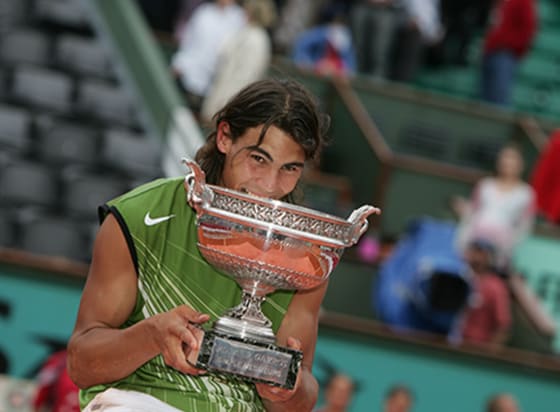
A teenager enters the Grand Slam roll of honour! Nadal had been on a fantastic run on the European clay, but at 18 and playing his first French Open, surely he was still too young to win a major? But on his birthday the buccaneering left-hander in the sleeveless shirt and pirate pants beat the world No 1 Roger Federer in the semi-finals, and then beat the surprise finalist Mariano Puerta in another four-setter to become a Grand Slam champion at 19 years and two days. Facing the photographers, he bit into the Coupe des Mousquetaires in what has become a signature celebration for Rafa.
A 60th consecutive win on clay achieves the title defence. When Federer led Nadal 6-1 and 40-0 after barely half an hour of the final, the Swiss maestro’s class looked likely to triumph. But Nadal had already shown that he knew how to handle Federer’s game on all surfaces, and after winning the second set, he dominated the rest of the match, thwarting Federer’s attempt to be only the third man in history to hold all four major titles at the same time. It was Federer’s first defeat in a major final.
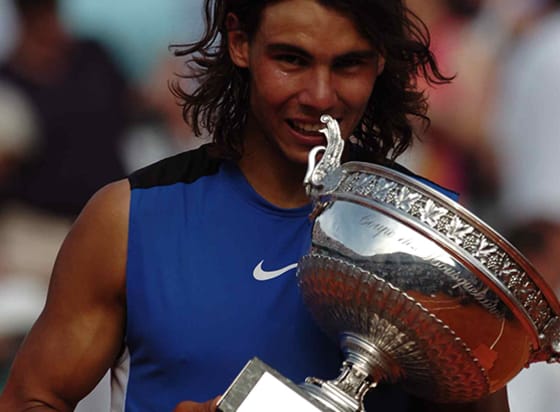
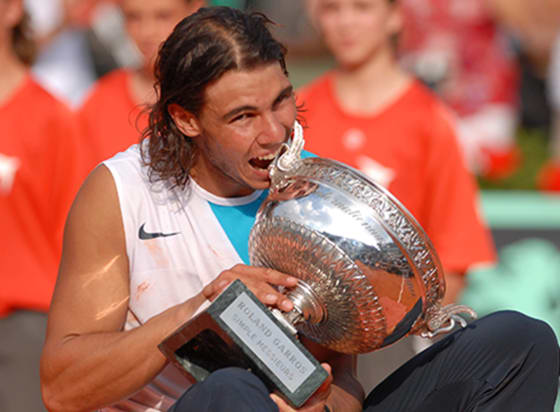
A very similar story to 2006. Federer held the other three Grand Slam titles, and having beaten Nadal in Hamburg four weeks earlier for his first victory over the Spaniard on clay, he was all set to make history. But Nadal saved 16 of the 17 break points he faced as Federer could find no way through. At one-set-all the final seemed on a knife-edge, but Nadal stormed to a third successive title. On the podium Nadal said “I am very happy, but I’m really sad for Roger. He is a friend and a great champion."

Arguably Nadal’s most emphatic display in a final. For the third final running, and the fourth year running at Roland Garros, Nadal faced Federer. He broke the Swiss in the first game of the final, and from 3-3 in the second set Nadal was irresistible, winning the last nine games to concede just four in the match and leave Federer shaking his head in disbelief. “Oui, c’est moi” Federer said to the crowd at the trophy ceremony, “yes, it’s me” – Nadal’s brilliance had made him look totally un-Federer-like.
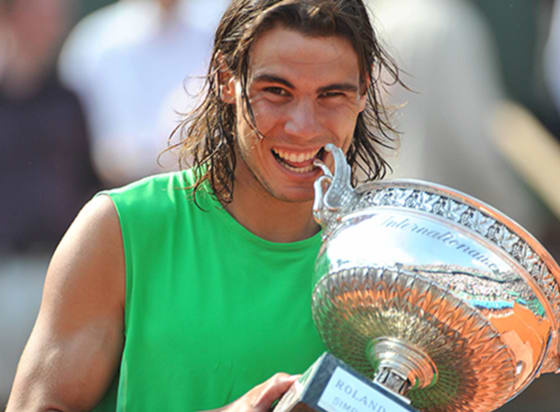
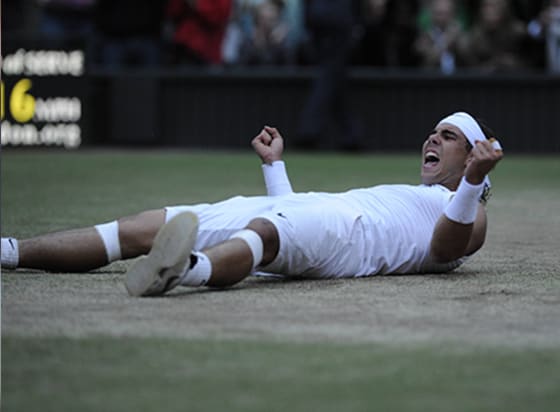
One of the most dramatic matches in the history of tennis. Nadal took the first two sets, but Federer came back to win the third. Nadal had match points in the fourth set tiebreak, but Federer found some superb shots to level at two-sets all. With rain regularly interrupting play in the last match before the Centre Court’s retractable roof was completed, it looked as if they wouldn’t finish on the Sunday night, but Nadal broke for 8-7, and with barely any daylight remaining, he won his first major outside Paris at 9.17pm. He arrived at the Wimbledon champions’ dinner dressed in dinner jacket and bow tie at 1am!
A five-set final that Nadal should have lost after a 5¼-hour semi-final over Fernando Verdasco on the Friday night, while Federer had beaten Andy Roddick in 1¼ hours a day earlier. Nadal admitted to feeling tired before the final, yet he won the first and third sets, and while Federer bounced back by taking the second and fourth, Nadal was by far the stronger player in the fifth, winning it 6-2 to become the first Spaniard – male or female – to win the Australian Open. The trophy ceremony is remembered for Nadal putting his arm round a tearful Federer to comfort him.
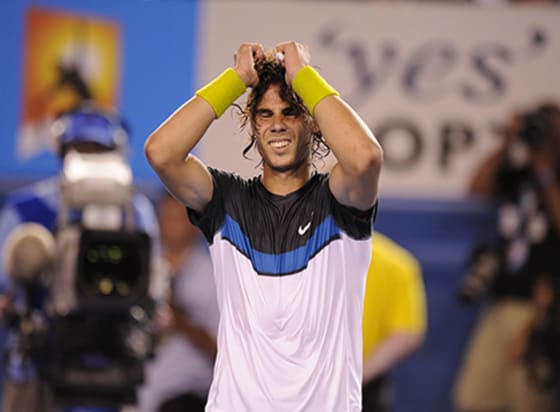
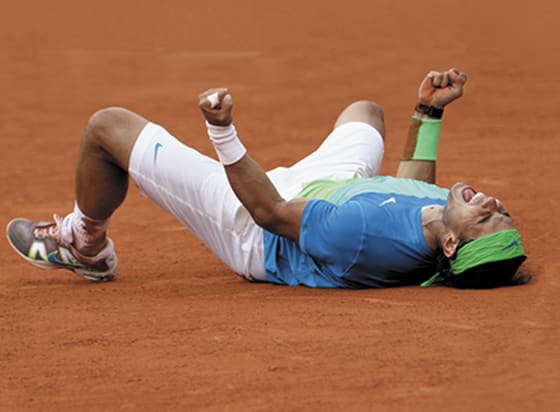
Revenge after the previous year’s defeat. In 2009, Robin Söderling beat Nadal in the fourth round, taking advantage of knee problems the Spaniard was suffering from. It was the first time Nadal had lost at Roland Garros, but a year later, the two men met in the final, and with no knee problems this time Nadal was not going to be so vulnerable. Right from the start he showed Söderling who was boss, blunting the Swede’s big serve to win for the loss of just 10 games. It took Nadal back to the top of the world rankings.
A dull final but an unbeaten run. After being unable to defend his 2008 title in 2009 because of injuries, Nadal put together a 14-match unbeaten run at Wimbledon with his second title. He needed to go to five sets in the second and third rounds, and then faced Tomas Berdych in the final after the Czech had beaten Federer and Novak Djokovic in the quarter- and semi-finals. But the Czech had nothing with which to damage Nadal in the final, and using the full width of the court, Nadal won in straight sets to establish himself as a genuine grasscourt player.
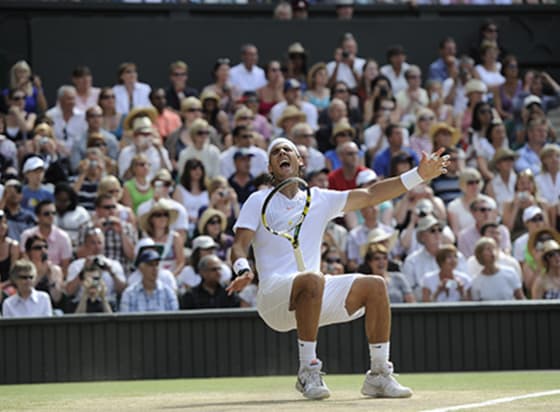
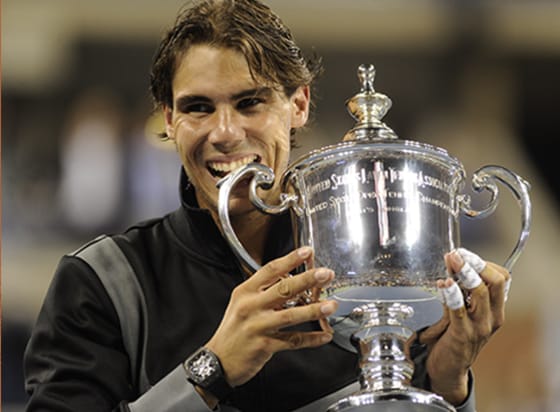
A career Grand Slam for the claycourter on the hard courts of New York! Nadal went to the US Open as the champion of Roland Garros and Wimbledon, but when Djokovic beat Federer in the semi-finals, his task became more difficult, as he always had more difficulty beating the Serb than the Swiss. After three punishing but high-quality sets, Nadal led 2-1, and the match was still on the line. But Nadal had more gas in the tank, Djokovic wilted in the fourth, and Nadal took the set 6-2 to become only the sixth man to complete the set of tennis’s four majors.
A title to interrupt the Djokovic show. Djokovic was unbeaten all year until Federer beat him in the Paris semi-finals. And when Federer had a set point in the first set of the final, he might have mounted a challenge for a first-ever win over Nadal at Roland Garros. But Nadal saved it, won the set, and while Federer won the third set, the first had broken the back of the final and Nadal cruised to a sixth French crown, equalling Björn Borg’s record of six titles won between 1974 and 1981. It proved the only major title in 2011 that Djokovic didn’t win.
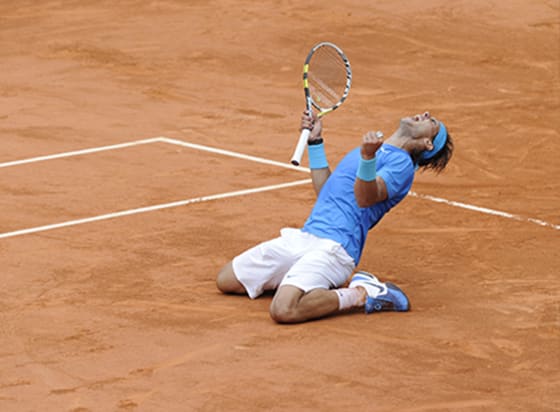
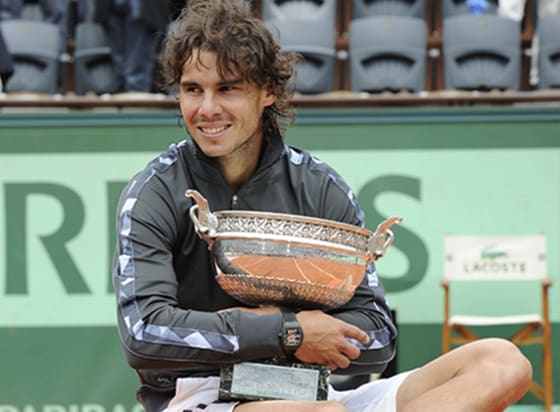
A final that showed just how much Nadal loves the sun. Djokovic was attempting to hold all four Grand Slam titles simultaneously, and Nadal was trying to avoid being beaten by Djokovic four majors in a row. The match began in bright sunshine, and Nadal won the first two sets. But then there were interruptions for showers, and as the skies became greyer, Djokovic won eight games on the run to win the third set and lead by a break in the fourth. Yet then the drizzle caused play to be abandoned for the day, and when they came back on Monday, Nadal was back to his best and became the first man to win seven Roland Garros singles titles.
Perhaps the easiest of his Paris finals, yet not that easy. The real drama had come in the semi-finals when Djokovic had led Nadal 4-1 with a double break in the fifth set, only for Nadal to fight back to win 9-7. After that, beating his loyal Davis Cup colleague and Spain’s No 2 David Ferrer was a walk in the park, and no-one seriously expected Ferrer to trouble Nadal on the Philippe Chatrier Court.
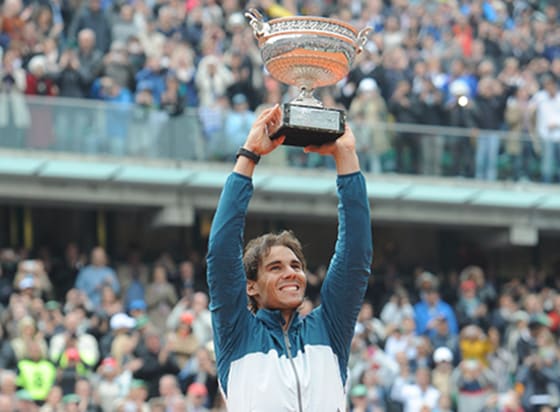
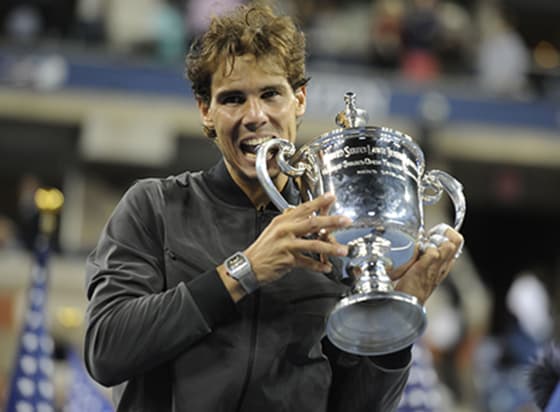
A grinding match against Djokovic that included a 74-stroke rally. Djokovic won the point, but Nadal’s ability to recover meant he seized control of the match shortly after. After Djokovic got the better of Nadal for much of 2011 and 2012, this four-sets victory confirmed that the Spaniard had learned how to counter the Serb, mainly by playing much closer to the baseline than he previously favoured. It was very similar to the 2010 final at Flushing Meadows, with Djokovic taking the second set but wilting in the fourth after Nadal had taken a 2-1 lead, Nadal taking the fourth set 6-1. It was his sixth win over Djokovic in their previous seven matches.
A 14th major to tie Pete Sampras’s tally which had seemed unreachable when Sampras set it in 2002. This time Nadal had to come back from a set down in the final against Djokovic, and at that point Djokovic had never lost in any of his 35 previous finals after taking the first set. But Nadal bounced back in the second, and his accuracy so frustrated Djokovic that the Serb smashed a racquet. Just as in 2012, approaching rain clouds threatened to help Djokovic, but that only spurred Nadal into piling on the pressure in the fourth set, and serving to stay in the match at 4-5, Djokovic double-faulted on match point, exactly the way he had conceded the 2012 final.
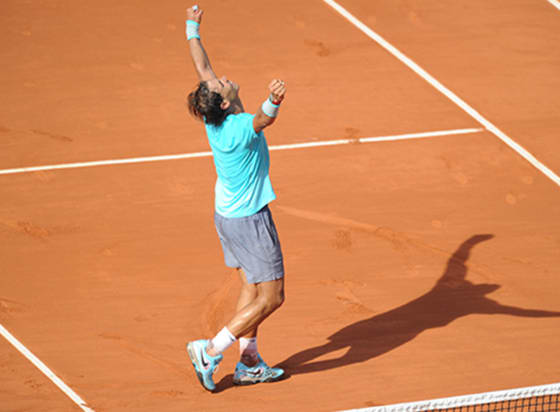
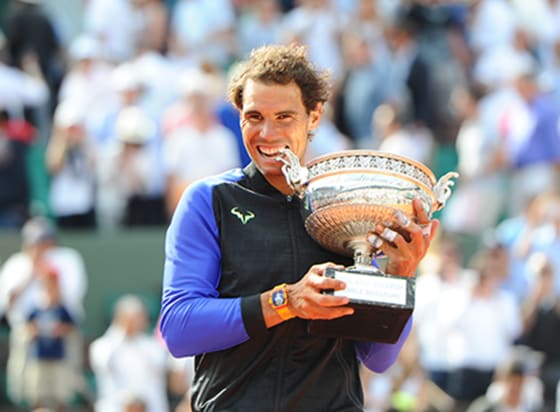
What a comeback for the history man! After being trounced by Djokovic in the 2015 quarter-finals and withdrawing through injury in 2016, many thought Nadal might be finished, even in Paris, but he bounced back to become the first man to win a single Grand Slam title 10 times and only the second man to win 15 majors – all without dropping a set in his seven matches. The final against Stan Wawrinka was a disappointment, partly because Wawrinka and Andy Murray had played a marathon semi-final that left them both with long-term injuries. But Nadal was in such great form, a fully fit opponent would have struggled to get more than the six games Wawrinka won.
First hardcourt title for over 3½ years. With Wawrinka and Djokovic injured, Nadal and Federer looked all set for their first-ever match at the US Open when Nadal reached the semi-finals. But Federer lost to Juan-Martin del Potro in the quarters, Nadal beat del Potro in the semis, and then crushed the tallest Grand Slam finalist in history, Kevin Anderson, in straight sets in the final. It meant that the four major titles in 2017 had been shared two-apiece by Federer and Nadal at 36 and 31 years of age.
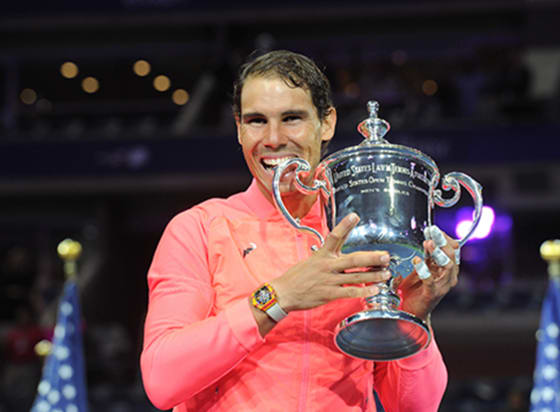
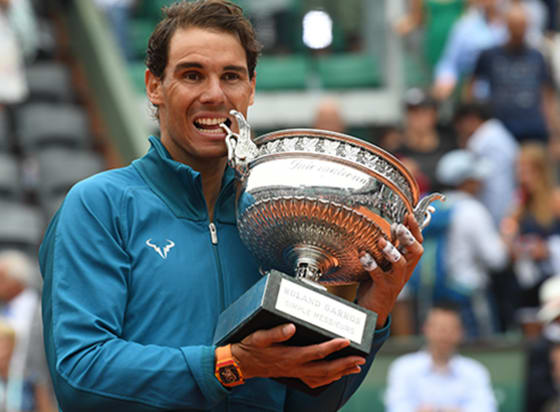
Wrist cramp proved to be Nadal’s biggest opponent. Nadal’s 11th Roland Garros title looks a formality in retrospect, especially with Federer absent and Djokovic still on the comeback trail following elbow problems, but in the final Nadal came up against the only player to have beaten him on clay in the previous two years, Dominic Thiem. For the first nine games it was a contest, but then Nadal ran away with the final, in fact his biggest obstacle seemed to be cramp in his left wrist that caused him to call for the trainer in the third set, but he was able to cruise to victory for the loss of just nine games.
Beware of poking the lion! This was a tournament in which Djokovic was expected to be Nadal’s equal – he was the world No 1 and playing some great tennis, but he faded in the semi-finals, losing to Thiem over two days. With Nadal beating Federer in ridiculously windy conditions in the other semi-final, the previous year’s Thiem-Nadal final was reprised. With Thiem having more experience than in 2018, his feat in claiming the second set 7-5 to make it one set all seemed to set the scene for a great contest. Yet it had the effect of poking a sleeping lion, as Nadal roared back to take the third and fourth sets 6-1 6-1, and become the first player – male or female – to win the same major 12 times, beating Margaret Court’s record of 11 in Australia.
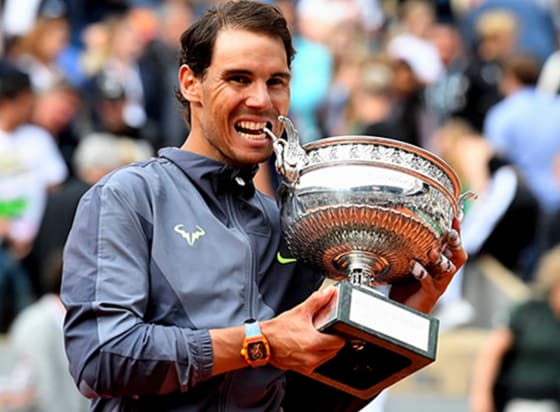
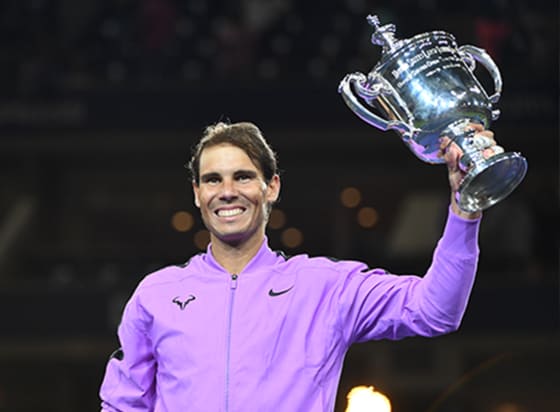
One of the best singles finals in recent years. Nadal came up against Daniil Medvedev, who was in great form having dominated the lead-up hardcourt tournaments, and had tamed the raucous New York crowd which had booed him earlier in the tournament. Nadal led by two sets and a break, but Medvedev bounced back to win the third and fourth. Serving at 0-1 in the fifth, Nadal faced two break points, but once he had saved them, he showed Medvedev what he had shown plenty of other players over the years – if you miss your chance against Nadal, he makes you pay. Nadal broke in the next game and won a high-quality final 6-4 in the fifth set.
The pandemic title, won on his familiar court in the unfamiliar month of October. Many felt the cooler weather of the early autumn, in which Roland Garros was played because its traditional dates fell during the five-month break caused by the Covid-19 outbreak, would work against Nadal’s chances, yet his level of tennis in the final against Djokovic was arguably the highest of his career. Djokovic won more games than Federer had in 2008, but Nadal may well have played better.
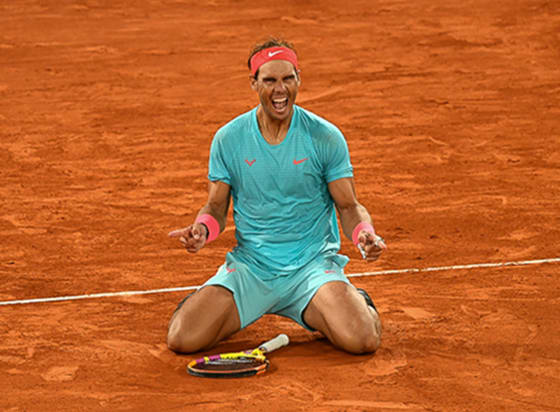
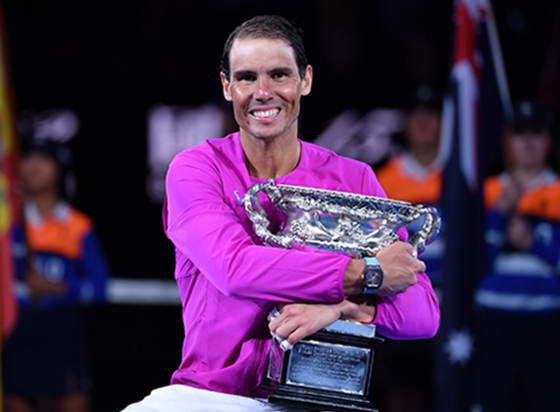
The record-breaking 21st title, achieved in remarkable circumstances in one of the craziest tournaments. Rafa won some tough matches en route to a final against Medvedev – including a four-hour quarter-final against Denis Shapovalov – and then produced a phenomenal performance to bounce back from two sets down to win in five in five hours and 24 minutes. 17 years after his first Grand Slam title, Rafa lifted the 21st title of his career, making him the most titled tennis player in history.
Another unlikely title despite all his previous successes. Not only was Nadal the fifth seed, he was clearly the third-favourite behind Djokovic and the year’s breakthrough player Carlos Alcaraz, another member of the Babolat family who had emulated so much of Nadal’s European spring of 2005 that culminated in his first Paris title.
Before Roland Garros, Nadal had missed several weeks with a rib injury, and after losing in Rome, he admitted his chronic foot injury had resurfaced. But he proved once again what a great champion he is and that he feels at home in his kingdom in Paris.
Going five sets against Félix Auger-Aliassime in the fourth round seemed a setback, but Nadal was brilliant against Djokovic in the quarter-finals, then beat Alcaraz’s conqueror Alexander Zverev in the semis, before beating Casper Ruud in three sets in the final.
This is greatness.